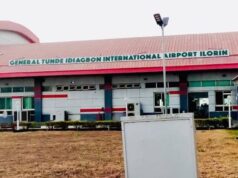
It was the British who first carved out an administrative unit and called it Wukari Federation. They did this in recognition of its multi ethnic and cosmopolitan outlook.
Prior to British conquest, Wukari was the headquarters of Kwararafa, a Kingdom established by the Jukun people. Their King–the Aku-Uka resided there and it also served as an important trading route connecting the south with such northern centers like Bauchi, Katsina, Kano and Borno. Large caravans were said to have brought goods transported from north of the Sahara in exchange for slaves, salt and ivory at Wukari.
The Jukuns themselves had in a period of extraordinary military activity conquered Zaria and broken through the formidable city walls of Kano to control the town. In fact, they were on their way to take another of the Hausa states – Katsina – before the military juggernaut lost its impetus. Kwararafa was already in decline and by 1804 when Othman Dan Fodio staged his Jihad, its days were numbered.
According to the Gazzette of Northern Nigerian Emirates, repeated attacks by forces of the Sokoto caliphate led by Buba Yero of Gombe, Abubakar Dogara and Buba Barkindo of Muri destroyed the power of Kwararafa. All these attacks took place between 1815 and 1860 during the reign of Aku Tsoukwa, the 12th king of Kororofa. The situation became more complex with the arrival in the Benue valley in the 1870s of a man of considerable notoriety, a Gobir of the old Hausa fighting stock who came with Bayero from Sokoto on slave riding expeditions. Dankaro was his real name but he rejoiced in the title of Serkin Yaki of Sokoto and was recruited by the Aku Uka to fight the Tiv.
He was a ruthless warrior and this reputation brought many soldiers of fortune to his side. This band of rouges took to stealing as a hobby while off the battle field. Their other activities also became a source of worry to the Aku Uka who had employed them.
But Dankaro, the freelance fighter without a cause and without a conscience was not bothered. Sometimes he fought for the Emir of Muri, at other times he joined forces with the Aku Ukas enemies at Jibu, Bantaje, Suntai and Donga to fight against the Aku Uka. In this style, he became a pest to the Jukun for many years.
His last grand military alliance was with the Tiv against whom he was employed by the Jukun to fight. With his new friends, he took on the Jukun around Akwana, took over the whole of that neighborhood and gleefully announced that this country was his own. Infact as the years went by, Dankaros contempt for the Jukun became so deep that he saw the Tiv as his permanent military partners.
In one of his raids against the Jukun, he captured and made an open bonfire of a powerful Jukun war fetish which was believed to be of such potency that it could demobilize the enemy’s war missile.
The Royal Niger Company had initially ignored his activities but when his frequent raids against innocent civilians threatened their commercial interests, the decision was taken to check Dankaro. A brilliant warrior and excellent tactician, he managed to escape many of the battles and ambushes mounted against him by trained European officers.
In the end, it was a kick from his horse that killed him. With his death, the Royal Niger Company was now in a position to save the Kwararafa Kingdom from the imminent annihilation it faced as a result of the activities of this same man they had employed.
The British incorporated Kwarafa kingdom with its headquarters in Wukari into the protectorate of Nigeria around 1900.
The Aku Uka was a powerful player in the indirect rule system, presiding over a multi-ethnic community, including Jukun, Tiv and Moslem Hausa Fulani and many others. The British delegated much authority to traditional rulers in the Northern Region.
In 1958, the Aku Uka of Wukari was one of the four such rulers serving as a minister without portfolio in the Executive Council of the region. Others were the Sultan of Sokoto, Emir of Katsina and Emir of Kano.
Compared with what has happened in Wukari since independence, the British certainly handled Wukari better than what independent Nigerian governments have done.
In the First Republic (1963–1966), the Jukun and Hausa supported the Northern Peoples Congress (NPC), while the Tiv supported the rival United Middle Belt Congess (UMBC) often leading to violent conflict. This informed the decision of the military government, as it prepared for the second republic, to take Wukari Federation from Benue Province where it had always belonged since 1900 and merge it with Adamawa in the Sardauna and Muri Provinces to form Gongola. It was a terrible misjudgment. The government announced that it was by that action, going to separate the squabbling between Tiv and Jukun tribesmen.
But having lived togather for over 200 years, separating the two could not be such a neat surgical operation. In fact, during the Second Republic (1979–1983) both the Tiv and the Jukun supported the National Party of Nigeria (NPN). With the military take over of power in 1983, the belligerent tribesmen returned to their trenches. There were clashes in 1990 and 1992. In 2001 and 2002, there were again clashes between the Jukun, Tiv, Kuteb and Fulani.
In August 2010, there was further fighting, this time along religious rather than ethnic lines. Christians disputed the construction of a mosque at the Wukari Police divisional headquarters, and started rioting a few days before a planned visit of the Sultan of Sokoto, Muhammad Sa’ad Abubakar 111. Since then, many more religious riots have taken place in Wukari.
The current situation has been further inflamed by Boko Haram who joined the fray in support of or at the behest of Fulani cattle grazers.
A new Dankaro has come to town in Wukari and things are not the same. The battle ground has become a more complex and intractable jinx. All these go to show the terrible mess we have made out of the independence we fought for. As Wukari Federation burns, so is the rest of the Federation called Nigeria
Read More Articles From This Author: Emmanuel Yawe






